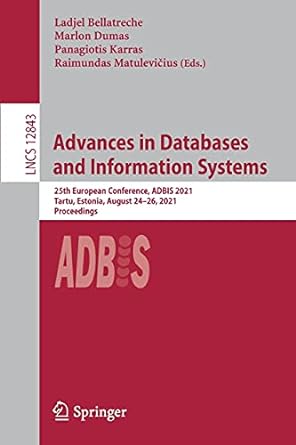Question
Give the code for the following functions (ie where it says YOUR CODE HERE). Thanks in advance. ### Variable occurrence in a variable def v_contains(self,
Give the code for the following functions (ie where it says "YOUR CODE HERE"). Thanks in advance.
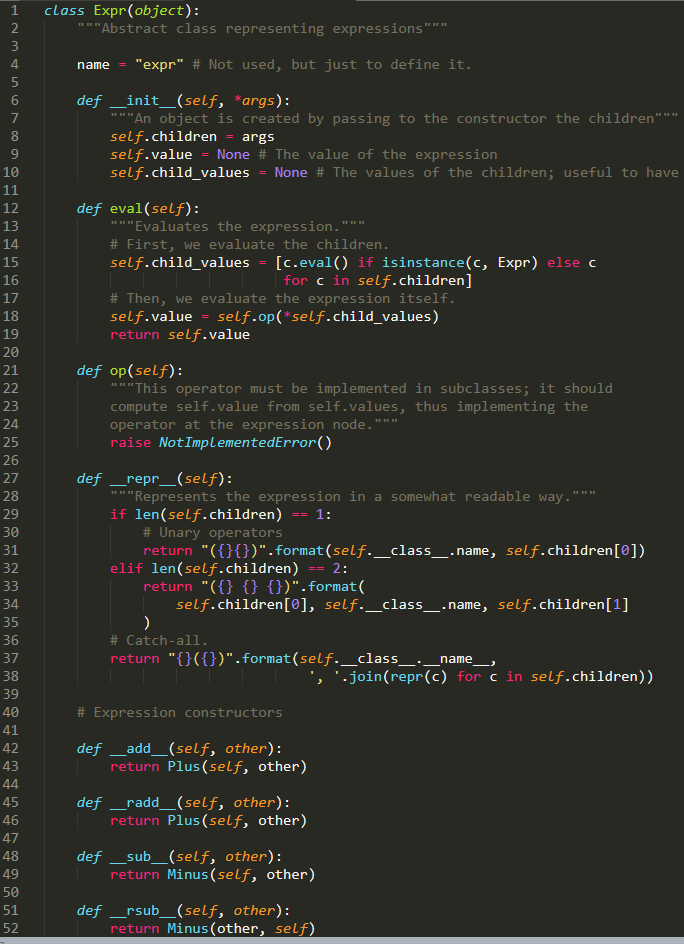
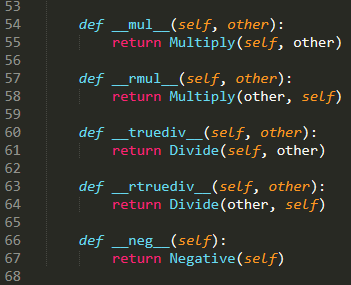
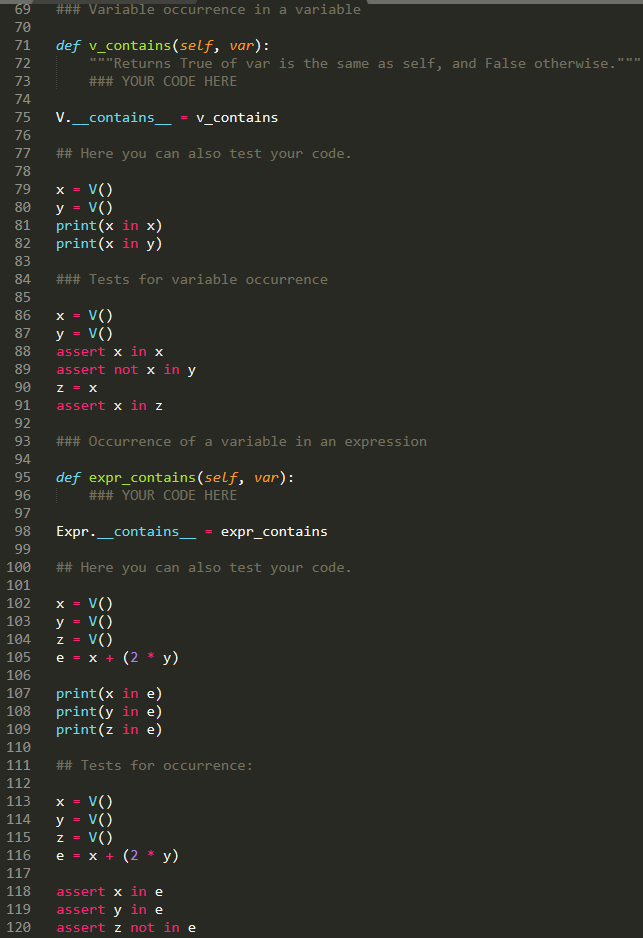
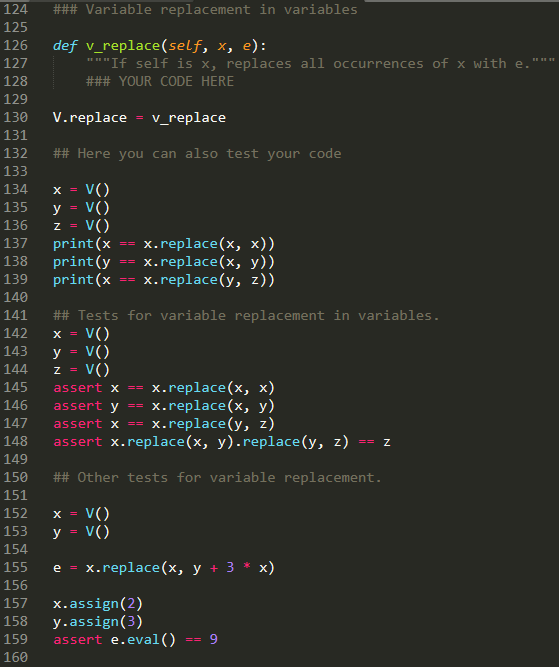
### Variable occurrence in a variable
def v_contains(self, var):
"""Returns True of var is the same as self, and False otherwise."""
### YOUR CODE HERE
V.__contains__ = v_contains
### Occurrence of a variable in an expression
def expr_contains(self, var):
### YOUR CODE HERE
Expr.__contains__ = expr_contains
### Variable replacement in variables
def v_replace(self, x, e):
"""If self is x, replaces all occurrences of x with e."""
### YOUR CODE HERE
V.replace = v_replace
class Expr(object): ***** Abstract class representing expressions name "expr" # Not used, but just to define it. 1 2 3 4 5 6 7 8 9 10 11 def _init_(self, *args): **An object is created by passing to the constructor the children" self.children args self.value None # The value of the expression self.child_values None # The values of the children; useful to have 12 def eval(self): ** Evaluates the expression." # First, we evaluate the children. self.child_values [c.eval() if isinstance(c, Expr) else c for c in self.children] # Then, we evaluate the expression itself. self.value = self.op(*self.child_values) return self.value def op(self): ** "* "This operator must be implemented in subclasses; it should compute self.value from self.values, thus implementing the operator at the expression node. ** raise NotImplementedError() 13 14 15 16 17 18 19 20 21 22 23 24 25 26 27 28 29 30 31 32 33 34 35 36 37 38 39 40 41 42 43 44 45 46 47 48 49 2: def repr_(self): "Represents the expression in a somewhat readable way." if len(self.children) 1: # Unary operators return "({}{})".format(self._class__.name, self.children[@]) elif len(self.children) return "({} {} {})".format( self.children[@], self._class__.name, self.children[1] ) # Catch-all. return "{}({})".format(self._class__name_ '.join(repr(c) for c in self.children)) # Expression constructors def _add_(self, other): return Plus(self, other) def _radd__(self, other): return Plus(self, other) def _sub__(self, other): return Minus(self, other) 50 51 52 def _rsub_(self, other): return Minus (other, self) def __mul_(self, other): return Multiply(self, other) def _rmul_(self, other): return Multiply (other, self) 53 54 55 56 57 58 59 60 61 62 63 64 65 66 67 68 def _truediv_(self, other): return Divide (self, other) def _rtruediv_(self, other): return Divide (other, self) def __neg_(self): return Negative(self) ### Variable occurrence in a variable def v_contains(self, var): ***"Returns True of var is the same as self, and False otherwise.' ### YOUR CODE HERE V.__contains v_contains ## Here you can also test your code. x = :VO) VO) print(x in x) print(x in y) ### Tests for variable occurrence 69 70 71 72 73 74 75 76 77 78 79 80 81 82 83 84 85 86 87 88 89 90 91 92 93 94 95 96 97 98 99 100 101 102 x = VO) y = v) assert xin x assert not x in y z = x assert xin z ### Occurrence of a variable in an expression def expr_contains (self, var): ### YOUR CODE HERE Expr. _contains expr_contains ## Here you can also test your code. 103 VO) EVO VO) e = x + (2 * y) Z = print(x in e) print(y in e) print(z in e) ## Tests for occurrence: 104 105 106 107 108 109 110 111 112 113 114 115 116 117 118 119 120 X = VO) y = VO Z = VO) e = x + (2 * y) assert xin e assert y in e assert z not in e ### Variable replacement in variables def v_replace(self, x, e): **** "If self is x, replaces all occurrences of x with e. ### YOUR CODE HERE V.replace v_replace ## Here you can also test your code X = VO) VO) Z VO) print(x print(y print(x x.replace(x, x)) X.replace(x, y)) x.replace(y, z)) 124 125 126 127 128 129 130 131 132 133 134 135 136 137 138 139 140 141 142 143 144 145 146 147 148 149 150 151 152 153 154 155 156 157 158 159 160 Z ## Tests for variable replacement in variables. X = VO) VO VO) assert x == x.replace(x,x) assert y X.replace(x, y) assert x == X.replace(y, z) assert x.replace(x, y).replace(y, z) Z ## Other tests for variable replacement. X = v VO) e = X.replace(x, y + 3 * x) x.assign(2) y.assign(3) assert e.eval() == 9 class Expr(object): ***** Abstract class representing expressions name "expr" # Not used, but just to define it. 1 2 3 4 5 6 7 8 9 10 11 def _init_(self, *args): **An object is created by passing to the constructor the children" self.children args self.value None # The value of the expression self.child_values None # The values of the children; useful to have 12 def eval(self): ** Evaluates the expression." # First, we evaluate the children. self.child_values [c.eval() if isinstance(c, Expr) else c for c in self.children] # Then, we evaluate the expression itself. self.value = self.op(*self.child_values) return self.value def op(self): ** "* "This operator must be implemented in subclasses; it should compute self.value from self.values, thus implementing the operator at the expression node. ** raise NotImplementedError() 13 14 15 16 17 18 19 20 21 22 23 24 25 26 27 28 29 30 31 32 33 34 35 36 37 38 39 40 41 42 43 44 45 46 47 48 49 2: def repr_(self): "Represents the expression in a somewhat readable way." if len(self.children) 1: # Unary operators return "({}{})".format(self._class__.name, self.children[@]) elif len(self.children) return "({} {} {})".format( self.children[@], self._class__.name, self.children[1] ) # Catch-all. return "{}({})".format(self._class__name_ '.join(repr(c) for c in self.children)) # Expression constructors def _add_(self, other): return Plus(self, other) def _radd__(self, other): return Plus(self, other) def _sub__(self, other): return Minus(self, other) 50 51 52 def _rsub_(self, other): return Minus (other, self) def __mul_(self, other): return Multiply(self, other) def _rmul_(self, other): return Multiply (other, self) 53 54 55 56 57 58 59 60 61 62 63 64 65 66 67 68 def _truediv_(self, other): return Divide (self, other) def _rtruediv_(self, other): return Divide (other, self) def __neg_(self): return Negative(self) ### Variable occurrence in a variable def v_contains(self, var): ***"Returns True of var is the same as self, and False otherwise.' ### YOUR CODE HERE V.__contains v_contains ## Here you can also test your code. x = :VO) VO) print(x in x) print(x in y) ### Tests for variable occurrence 69 70 71 72 73 74 75 76 77 78 79 80 81 82 83 84 85 86 87 88 89 90 91 92 93 94 95 96 97 98 99 100 101 102 x = VO) y = v) assert xin x assert not x in y z = x assert xin z ### Occurrence of a variable in an expression def expr_contains (self, var): ### YOUR CODE HERE Expr. _contains expr_contains ## Here you can also test your code. 103 VO) EVO VO) e = x + (2 * y) Z = print(x in e) print(y in e) print(z in e) ## Tests for occurrence: 104 105 106 107 108 109 110 111 112 113 114 115 116 117 118 119 120 X = VO) y = VO Z = VO) e = x + (2 * y) assert xin e assert y in e assert z not in e ### Variable replacement in variables def v_replace(self, x, e): **** "If self is x, replaces all occurrences of x with e. ### YOUR CODE HERE V.replace v_replace ## Here you can also test your code X = VO) VO) Z VO) print(x print(y print(x x.replace(x, x)) X.replace(x, y)) x.replace(y, z)) 124 125 126 127 128 129 130 131 132 133 134 135 136 137 138 139 140 141 142 143 144 145 146 147 148 149 150 151 152 153 154 155 156 157 158 159 160 Z ## Tests for variable replacement in variables. X = VO) VO VO) assert x == x.replace(x,x) assert y X.replace(x, y) assert x == X.replace(y, z) assert x.replace(x, y).replace(y, z) Z ## Other tests for variable replacement. X = v VO) e = X.replace(x, y + 3 * x) x.assign(2) y.assign(3) assert e.eval() == 9Step by Step Solution
There are 3 Steps involved in it
Step: 1

Get Instant Access to Expert-Tailored Solutions
See step-by-step solutions with expert insights and AI powered tools for academic success
Step: 2

Step: 3

Ace Your Homework with AI
Get the answers you need in no time with our AI-driven, step-by-step assistance
Get Started


